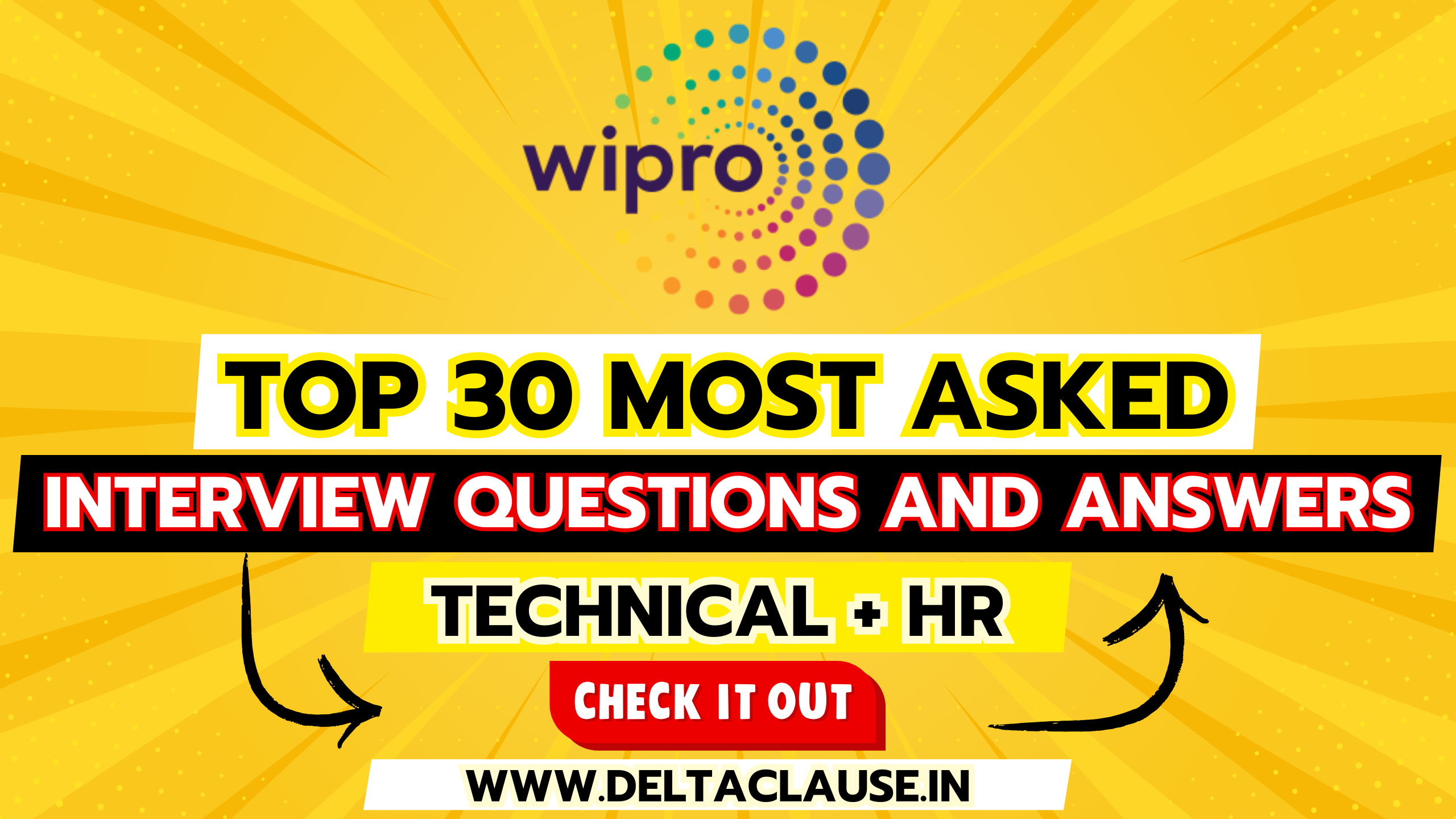Introduction
Wipro is one of the leading IT services companies globally, making it a dream employer for many aspiring candidates. Cracking the Wipro interview requires thorough preparation in both technical and HR aspects. To help you succeed, we have compiled the Top 30 most asked Wipro interview questions and answers along with their answers. Whether you are a fresh graduate or an experienced professional, this guide will boost your confidence and help you ace your Wipro interview.
Technical Interview Questions
1. Explain Object-Oriented Programming (OOP) principles.
Answer: OOP consists of four key principles:
- Encapsulation (data hiding),
- Abstraction (hiding implementation details),
- Inheritance (code reusability), and
- Polymorphism (multiple forms of a function or method).
2. What is the difference between C and C++?
Answer:
- C is a procedural programming language, whereas C++ supports both procedural and object-oriented programming.
- C does not support classes and objects, while C++ does.
3. What is normalization in DBMS?
Answer: Normalization is the process of organizing data to minimize redundancy. It includes 1NF, 2NF, 3NF, and BCNF.
4. Explain the difference between primary key and foreign key.
Answer:
- Primary Key uniquely identifies a record in a table.
- Foreign Key is a reference to the primary key in another table, ensuring referential integrity.
5. What are the differences between Java and Python?
Answer:
- Java is statically typed, while Python is dynamically typed.
- Java requires explicit declaration of variables, but Python does not.
- Python is more concise and beginner-friendly than Java.
6. What is an operating system and its types?
Answer: An OS manages computer hardware and software. Common types include Batch OS, Multitasking OS, Distributed OS, and Real-time OS.
7. What is the difference between GET and POST methods in HTTP?
Answer:
- GET is used to retrieve data from a server and can be cached.
- POST is used to send data to a server and cannot be cached.
8. Explain the differences between stack and queue.
Answer:
- Stack follows LIFO (Last In, First Out), while Queue follows FIFO (First In, First Out).
- Stack is used in recursion, whereas Queue is used in scheduling.
9. What are joins in SQL?
Answer: Joins are used to combine rows from multiple tables. The types include INNER JOIN, LEFT JOIN, RIGHT JOIN, and FULL JOIN.
10. What is a pointer in C?
Answer: A pointer is a variable that stores the memory address of another variable.
11. What is Agile methodology?
Answer: Agile is an iterative development methodology emphasizing collaboration, flexibility, and customer feedback.
12. What are static and dynamic memory allocation?
Answer:
- Static memory allocation occurs at compile-time.
- Dynamic memory allocation occurs at runtime using
malloc()andfree()in C.
13. Explain the difference between multithreading and multiprocessing.
Answer:
- Multithreading allows multiple threads within a single process.
- Multiprocessing runs multiple processes on different CPUs.
14. What is a deadlock in an operating system?
Answer: A deadlock occurs when two or more processes block each other, preventing execution.
15. What is cloud computing?
Answer: Cloud computing delivers computing services like servers, storage, and databases over the internet.
HR Interview Questions
16. Tell me about yourself.
Answer: Keep it concise. Mention your education, skills, experience (if any), and career goals.
17. Why do you want to join Wipro?
Answer: Talk about Wipro’s innovation, work culture, learning opportunities, and its role in the IT industry.
18. What are your strengths and weaknesses?
Answer:
- Strengths: Problem-solving, leadership, adaptability.
- Weaknesses: Mention an area of improvement and how you’re working on it.
19. Where do you see yourself in 5 years?
Answer: Mention growth within Wipro, taking up leadership roles, and adding value to the company.
20. What are your salary expectations?
Answer: If you are a fresher, say “As per industry standards.” If experienced, give a reasonable range.
21. How do you handle pressure?
Answer: Mention time management, prioritization, and problem-solving techniques.
22. Tell me about a time you failed and what you learned from it.
Answer: Share a real experience, focus on learning, resilience, and improvement.
23. What makes you different from other candidates?
Answer: Highlight unique skills, adaptability, quick learning, or relevant experience.
24. Do you prefer working in a team or individually?
Answer: Say you are comfortable with both but emphasize teamwork.
25. Why should we hire you?
Answer: Showcase your skills, enthusiasm, and alignment with Wipro’s values.
26. Are you willing to relocate?
Answer: If yes, say “I am open to relocation for career growth.”
27. How do you deal with criticism?
Answer: Mention how you take it constructively and improve accordingly.
28. What is your biggest achievement?
Answer: Talk about a project, certification, or challenge you overcame successfully.
29. Describe your leadership experience.
Answer: Share an instance where you led a team or took initiative.
30. Do you have any questions for us?
Answer: Ask about career growth, training programs, or company projects.
Final Words of Encouragement
Acing a Wipro interview requires technical knowledge, confidence, and clear communication. Preparation is key, so practice coding, revise core subjects, and work on your soft skills. Stay calm, be honest, and show enthusiasm for the role. Believe in yourself, and you’ll do great!
Good luck with your Wipro interview! 🚀
